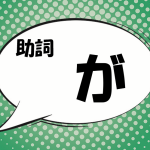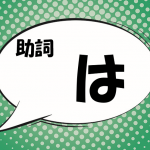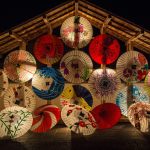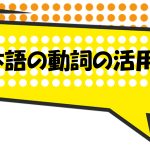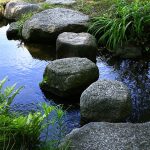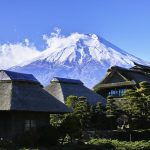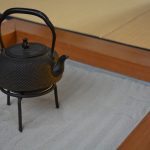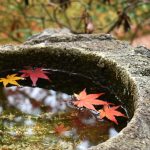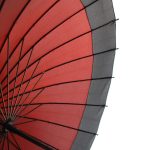
目次
What are Japanese participles?
Let’s learn the particle ga/が for now.
The Particle ga/が
The particle ga/が works as a to things you give attention marker. When a word is followed by ga/が, it will be marked as a thing you give attention to.
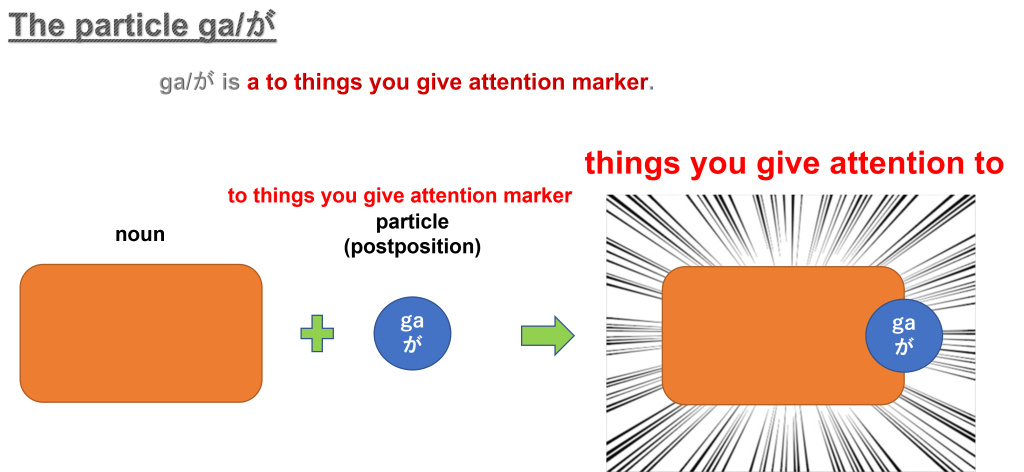
In Japanese some specific words are followed by ga/が to give them attention and they are things you like, things you need, things you want, things you can do, things you can't believe, things you find, things having identity, things which are/were in a remarkable state, an only alternative, a subject of WH question and an answer of WH question.
That is, ga/が can be the following markers.
- a things you like marker
- a things you need marker
- a things you want marker
- a things you can do marker
- a things you can't believe marker
- a things you find marker
- a things having identity marker
- a things which are/were in a remarkable state marker
- a things you're trying to introduce marker
- an only alternative marker
- a subject of WH question marker
- an answer of WH question marker
When to use the particle ga/が
ga/が is a to things you give attention marker. Let's check out more detail.
- ga/が can be a things you like marker.
Let's look at an example:
<Example 1>
Eega ga suki.
えいが が すき。
映画 が 好き。
[movies ga/が favorite]
I like movies.
If you say "eega ga suki", "eega/えいが" is the thing you like and it should be followed by ga/が. Remember that the adjective "suki/すき" is often used with ga/が because ga/が can be a things you like marker.
- ga/が can be a things you need marker.
Let's look at some examples:
<Example 2-1>
Motto okane ga hitsuyoo desu.
もっと おかね が ひつよう です。
もっと お金 が 必要 です。
[more money ga/が need is]
I need more money.
If you say "motto okane ga hitsuyou desu", "okane/おかね" is the thing you need and it should be followed by ga/が. Remember that the adjective "hitsuyou/ひつよう" is often used with ga/が because ga/が can be a things you need marker.
<Example 2-2>
Motto okane ga iru.
もっと おかね が いる。
もっと お金 が 要る。
[more money ga/が need]
I need more money.
If you say "motto okane ga iru", "okane/おかね" is the thing you need and it should be followed by ga/が. "iru/いる" is a verb which means "need" in English and it is often used with ga/が because ga/が can be a things you need marker.
- ga/が can be a things you want marker.
Let's look at an example:
<Example 3>
Tokei ga hoshii.
とけい が ほしい。
時計 が 欲しい。
[Watch ga/が desire]
I want a watch.
If you say "tokei ga hoshii", "tokei/とけい" is the thing you want and it should be followed by ga/が. Remember that the adjective "hoshii/ほしい" is often used with ga/が because ga/が can be a things you want marker.
- ga/が can be a things you can do marker.
Let's look at an example:
<Example 4>
Eego ga dekiru.
えいご が できる。
英語 が 出来る。
[English ga/が possible]
I can use English.
If you say "eego ga dekiru", "eego/えいご" is the thing you can do and it should be followed by ga/が. Remember that the verb "dekiru/できる" is often used with ga/が because ga/が can be a things you can do marker.
- ga/が can be a things you can't believe marker.
Let's look at an example:
<Example 5>
Kore ga tamago desu ka.
これ が たまご です か。
これ が 卵 です か。
[this ga/が egg is ?]
Is this (really) egg?
When someone said “This is an egg” and you can’t believe it, you can express your unbelievable feeling by using ga/が. You can say “Kore ga tamago desu ka”, meaning “Is this really egg?”
Here, "kore/これ" is a thing you can't believe.
Generally, when we can’t believe something, we want to make sure if it is true or not. You can use ga/が to give attention the target of which you want to make sure.
- ga/が can be a things you find marker.
Let's look at some examples:
<Example 6-1>
Hebi ga iru.
へび が いる。
蛇 が いる。
[a snake ga/が is ?]
There is a snake?
If you say "hebi ga iru", "hebi/へび" is the thing you find and it should be followed by ga/が. Remember that the verb "iru/いる" is often used with ga/が because ga/が can be a things you find marker.
<Example 6-2>
Heya ni tsukue ga aru.
へや に つくえ が ある。
部屋 に 机 が ある。
[room ni/に desk ga/が is] or [room ni/に desks ga/が are]
There is a desk in the room. / There are desks in the room.
If you say "Heya ni tsukue ga aru", "tsukue/つくえ" is the thing you find and it should be followed by ga/が. Remember that the verb "aru/ある" is often used with ga/が because ga/が can be a things you find marker.
- ga/が can be a things having identity marker.
Let's look at some examples:
<Example 7-1>
Umi ga kirei.
うみ が きれい。
海 が きれい。
[the sea ga/が beautiful]
The sea is so beautiful.
When you say "sea" in English, it means "sea in general." On the other hand, when you say "the sea" in English it means "sea which have identity."
Like this example, if you want to express specific sea, it should be followed by ga/が because ga/が can be a things having identity marker.
What is the sea which have identity?
For example, seas are not always beautiful. There are some seas which are dirty and not clean. If you find a beautiful sea, you can use ga/が to imply "especially here."
Another example might be that seas become more beautiful during a certain time of the day. ga/が can be used to imply "especially now."
<Example 7-2>
Ashita ame ga furu.
あした あめ が ふる。
明日 雨 が 降る。
[tomorrow rain ga/が fall]
It will rain tomorrow.
Raining occurs an specific area of the world, that is why "ame/あめ" which means "rain" is usually followed by a things having identity marker ga/が.
- ga/が can be a things which are/were in a remarkable state marker.
Let's look at some examples:
<Example 8-1>
Taiyoo ga mabushii.
たいよう が まぶしい。
太陽 が 眩しい。
[the sun ga/が bright]
The sun is bright especially now. / The sun is bright especially here.
The particle ga/が is used to talk about something which are/were in a remarkable state in contrast to the particle wa/は which is used to talk about general truths.
For example "The sun is bright (in general)" is a general truth. wa/は is used to introduce a general truth like this.
Japanese usually don't say "Taiyoo wa/は mabushii" which means "The sun is bright in general" because we usually don't care about it in our daily life.
Imagine a situation when the sunlight is directly shining onto us and we can't ignore the brightness. In this context we can use ga/が to imply "especially now" or "especially here."
<Example 8-2>
Atama ga itai.
あたま が いたい。
頭 が 痛い。
[head ga/が painful]
I have a headache especially now.
Again keep in mind that the particle ga/が is used to talk about something which are/were in a remarkable state in contrast to the particle wa/は which is used to talk about general truths.
Headache is an occasional event. Human don't always have a headache in general.
The adjective "itai/いたい" is usually used with the particle ga/が because a pain is usually temporary thing.
Similarly, "kowareru/こわれる", meaning "break", is also usually used with the particle ga/が for the same reason.
- ga/が can be a things you're trying to introduce marker.
Let's look at an example:
<Example 9>
Mukashi mukashi arutokoro ni ojiisan to obaasan ga sunde-i-mashita.
むかし むかし あるむら に おじいさん と おばあさん が すんでいました。
昔 昔 ある村 に お爺さん と お婆さん が 住んでいました。
[long-ago long-ago certain-village ni/に old man to/と old woman ga/が live-is-polite-past]
Long, long ago, there lived an old man and woman in a village.
You can often find this kind of sentence in the beginning of a story. Here, "ojiisan to obaasan" are the people you're trying to introduce and it should be followed by ga/が because ga/が can be a things you're trying to introduce marker.
- ga/が can be an only alternative marker.
Let's look at an example:
<Example 10>
Tookyoo ga nihon no syuto desu.
とうきょう が にほん の しゅと です。
東京 が 日本 の 首都 です。
[Tokyo ga/が Japan of capital is]
Tokyo is the only capital of Japan.
The capital of Japan is only one, which is only Tokyo. There isn't anything else except Tokyo. ga/が is used to give people more attention to something which is only one and to imply that anything else is not exist.
- ga/が can be a subject of WH question marker.
- ga/が can be an answer of WH question marker.
Let's look at some examples:
<Example 11>
Dare ga tsukutta no.
だれ が つくった の。
誰 が 作った の。
[who ga/が made ?]
Who made it?
<Example 12>
Boku ga tsukutta.
ぼく が つくった。
僕 が 作った。
[I ga/が made]
I made it.
When "dare/だれ" which means "who", "itsu/いつ" which means "when", "doko/どこ" which means "where", "nani/なに" which means "what" or "dore/どれ" which means "which" is the subject in a question sentence, they are usually followed by ga/が.
Also, the answer of WH question is usually followed by ga/が.
If you want to use ga/が perfectly, you need to know the difference between ga/が and wa/は. This is because ga/が can be interchangeable with wa/は grammatically even though the meaning of the sentence changes slightly.
Please visit below link to find it out.
You may also like
https://jpgrammar.com/gavswa/
